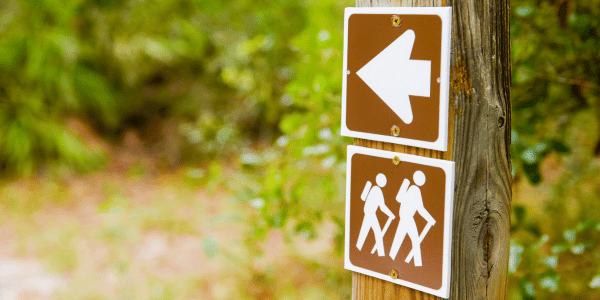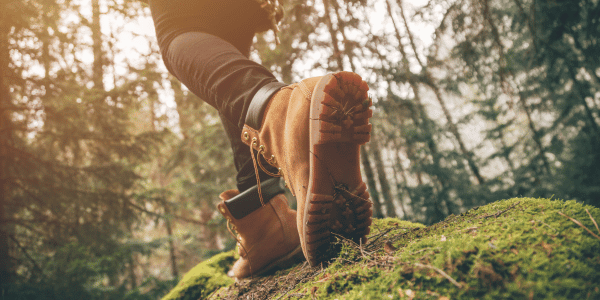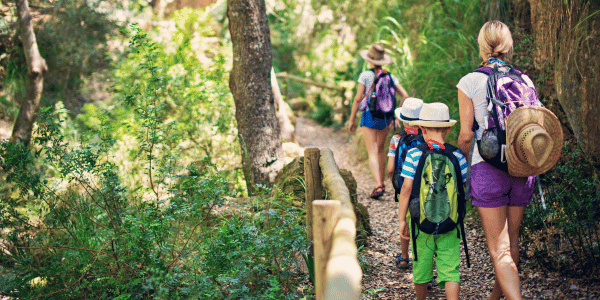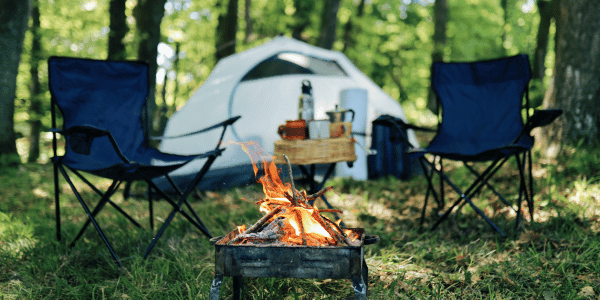Take a Hike: Discover the Benefits of Hitting the Trail
Get this: You don’t have to be in top shape to take a hike. A walk in nature can be as intense or leisurely as you’d like—and you’ll still be able to reap tons of the health benefits of hiking.
Why is hiking good for you? Getting outside and traversing trees, boulders, streams, or any green space can transform your mind and body in incredible ways. And we’re not just making this up; plenty of research suggests that hiking is a unique experience that conveys benefits you won’t find in typical exercise.
Take a look at these five benefits of hiking and the advantages of hitting the trail.
5 Key Benefits of Hiking
Hiking as a workout has dozens of benefits, but these five are some of the most beneficial. If you're thinking about stepping into the hobby, follow along to find out if hiking is the right activity for you. If you do become a consistent hiker, you should find that stepping into the wild:
1. Improves Emotional Well-Being.
Hiking in nature can support emotional stability. A form of active therapy, hiking allows you to clear your mind, disconnect from the hustle and bustle of daily life, and find contentment.
When it comes to the mental benefits of hiking, hiking also lifts your mood, promotes mindfulness, and reduces negative thought patterns. As you physically move through a hike, your brain releases endorphins. Increased endorphins may relieve the symptoms of stress, anxiety, and depression.
In addition, fresh air and breathing exercises can raise levels of oxygen in your brain, which consequently raises the levels of serotonin, a neurotransmitter that regulates your mood. When your serotonin levels are normal, you feel focused, emotionally stable, calm, and happy.
On your next hike, fill your emotional tank by practicing mindfulness and meditation, setting an intention, and concentrating on your breathing.

2. Keeps You Fit.
Unlike other forms of exercise, hiking uses your arms, back, abs, legs, and feet. This makes crossing various terrains an excellent full-body workout. Here’s what hiking as a workout does to encourage physical fitness:
- Helps burn calories without losing muscle. Whether you’re climbing fast or slow, the effort and resistance you put into each step count towards your total calorie burn without sacrificing muscle loss.
- Increases muscle strength. With legs supporting your weight and equipment, you build lower body strength using your glutes, quads, and hamstrings.
- Works your core, even though it doesn’t feel like it. By balancing uneven territories and carrying a backpack, you’re engaging your core area and developing abs and obliques.
3. Provides Mental Stimulation.
Hiking and mental health go hand-in-hand and have been linked to several brain-boosting benefits. While on the trail, you’re navigating a route, figuring out the terrain, overcoming obstacles, and searching for trail markers.
With a heightened attention span and focus, you’re exercising your mind’s proprioception, which is an awareness of your body’s position and movement in relation to its surroundings.
Responding to challenges and encountering unpredictable circumstances helps keep your mind sharp. You learn from the obstacles you encounter on a hike, expanding your creativity and enhancing your problem-solving skills.
4. Offers Cardiovascular Health Perks.
Any aerobic exercise that gets your heart pumping (like hiking!) will improve your cardiovascular health. During cardio exercise, your muscles circulate blood through the body, shouldering some of the strain on the heart.
As your intensity escalates, your heart beats faster to supply more blood and oxygen to your working muscles. Additionally, the benefits of walking every day and moving your body help your heart become stronger and your blood circulate better.
When your heart is healthy, you reduce your risk for:
- Heart disease
- Stroke
- High blood pressure
- Heart attack
5. Helps Strengthen Relationships.
A major hiking benefit is always having someone to share it with. Getting in nature and away from everyday distractions, you’re more attuned to the people around you. It’s easier to concentrate, empathize, and cooperate with your friend or partner.
Similarly, you’ll learn the value of teamwork and accountability. Hiking can offer unique circumstances, such as narrow pathways, tricky topography, and slippery grounds, that provide opportunities to trust and lean on your hiking partner. By depending on one another to navigate a hike, you strengthen your bond and relationship.

6 Hiking Tips for Beginners
Plan ahead.
Pick an easy trail for beginners, and check the weather before you go. The AllTrails app is a great place to get crowdsourced trail ratings and reviews.
Dress accordingly.
Choose waterproof shoes with good traction. Dress in light layers and wear clothes that prevent chafing and scratching.
Pack the essentials.
For a simple day hike, you should bring hiking boots, a cell phone, a paper map, a compass, food, water, a first aid kit, a flashlight, sunscreen, and sunglasses.

Stay hydrated and fed.
Pack one liter of water for every two hours of hiking. High-energy foods, like trail mix, protein bars, and jerky, should also be in your packing gear to keep you properly satiated for your hike.
Pace yourself.
Hike at a pace that’s comfortable for you, and don’t try to rush it. Ensure you have enough energy to walk down your hiking trail of choice by taking it slow and steady.
Be safe.
Let someone know where you’ll be and when you’ll return. Stick to marked trails and head back early if you’re worn out.
Pack for Your Next Hiking and Camping Trip
The benefits of hiking extend beyond physical exercise. Hiking is also a great activity to add to your itinerary during excursions like camping trips. From improving emotional well-being and promoting mindfulness to stimulating the mind and enhancing cardiovascular health, this outdoor activity can boost moods and improve your health before nights by the campfire. Check out our list of "Everything You Need to Bring on a Summer Camping Trip" to get a packing list for hiking and all your other camping activities.

Hiking FAQs
What qualifies as a hike?
A hike is any long and strenuous walk, usually on a trail, in a park, or in some other outdoor setting, such as a forest, mountains, or countryside.
What to bring hiking?
To go hiking safely and comfortably, you should bring a cell phone, a paper map, a compass, food, water, a first aid kit, a flashlight, sunscreen, and sunglasses.
How should hiking boots fit?
Hiking boots should be snug but not tight, with enough room for your toes to be comfortable but not too much room for your foot to be loose.
How to train for hiking?
Smaller cardio sessions will help you be in good shape for hiking. Consider lightly jogging multiple times a week or going on shorter walks before doing long hikes.
What is thru hiking?
Thru-hiking is the practice of hiking on a long-distance path without stopping. Depending on your starting point, this usually involves crossing through multiple states or countries.